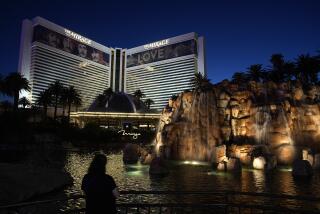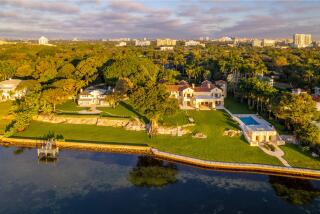Resorts Posts $303-Million Loss for 1989
- Share via
Resorts International, the struggling gambling company headed by Hollywood producer Merv Griffin, sustained losses of more than $300 million for the second year in a row, the company said Monday.
The company lost $303 million in 1989, $181 million of which resulted from a writeoff of its goodwill, an intangible asset that reflects what a buyer pays for a property beyond its tangible value.
Griffin bought Resorts in late 1988 for $365 million, an amount that even he later conceded was way too high.
“This is part of the company’s philosophy of biting the bullet and starting fresh,” said Resorts attorney Thomas E. Gallagher, who works for Gibson, Dunn & Crutcher in New York.
Resorts also announced Monday that it plans to sell its casino hotel operations on Paradise Island in the Bahamas after its reorganization is completed. Resorts is operating with protection from its creditors under Chapter 11 of the U.S. Bankruptcy Code.
Resorts also announced that it had amended its reorganization plan to increase the value of its debt load by $20 million and decrease the amount of Griffin’s cash infusion to $26 million from $30 million. The company hopes to complete the reorganization by midsummer, Gallagher said.
The reorganization plan calls for Griffin to reduce his majority ownership in Resorts to 22% in exchange for a steep reduction in the value of the company’s long-term bonds, which now have a face value of more than $900 million. Resorts quit paying interest on those bonds last summer.
Resorts’ primary asset is its Atlantic City, N.J., casino hotel, which has been in financial trouble for months. In the first three months of 1990, its gambling revenues fell sharply to $46.1 million, ranking it next to last among the city’s 11 casinos.
Though almost all of the 1989 losses stemmed from writeoffs and interest costs, Resorts also had an operating loss of $7.85 million. Resorts lost $381 million in 1988, primarily due to high interest expenses, but had an operating gain of $28.4 million.
One reed of hope is developer Donald J. Trump’s glitzy Taj Mahal casino hotel, which opened in early April. Resorts has gotten some spillover from the Taj crowds.
More to Read
Inside the business of entertainment
The Wide Shot brings you news, analysis and insights on everything from streaming wars to production — and what it all means for the future.
You may occasionally receive promotional content from the Los Angeles Times.










